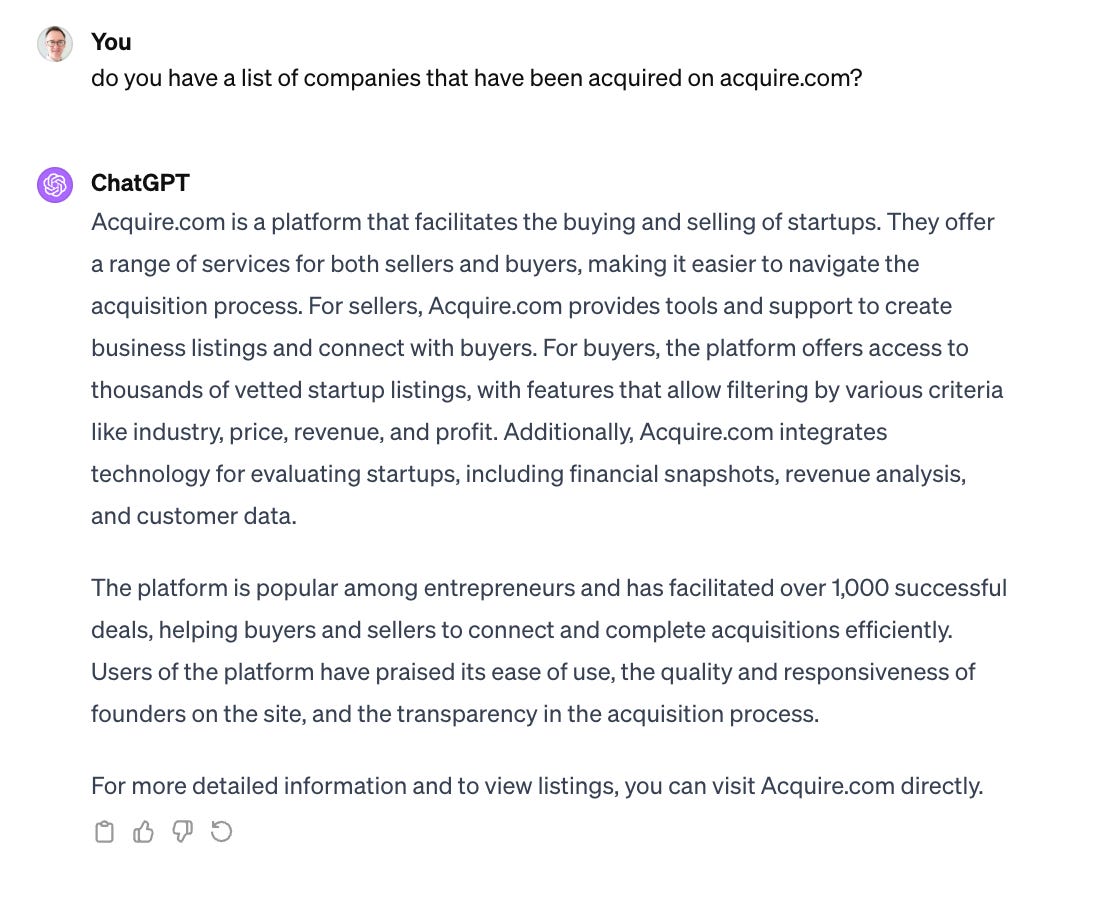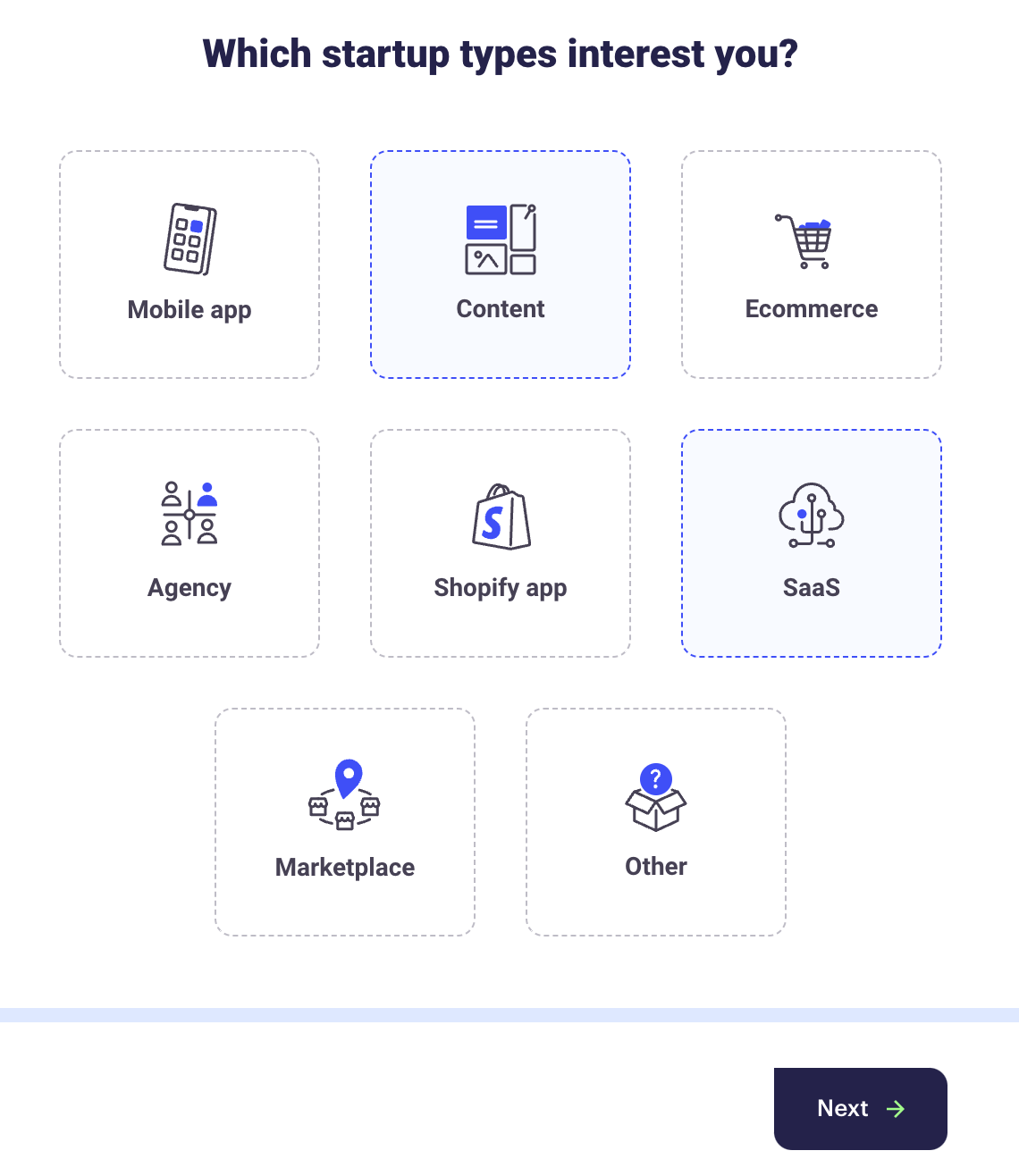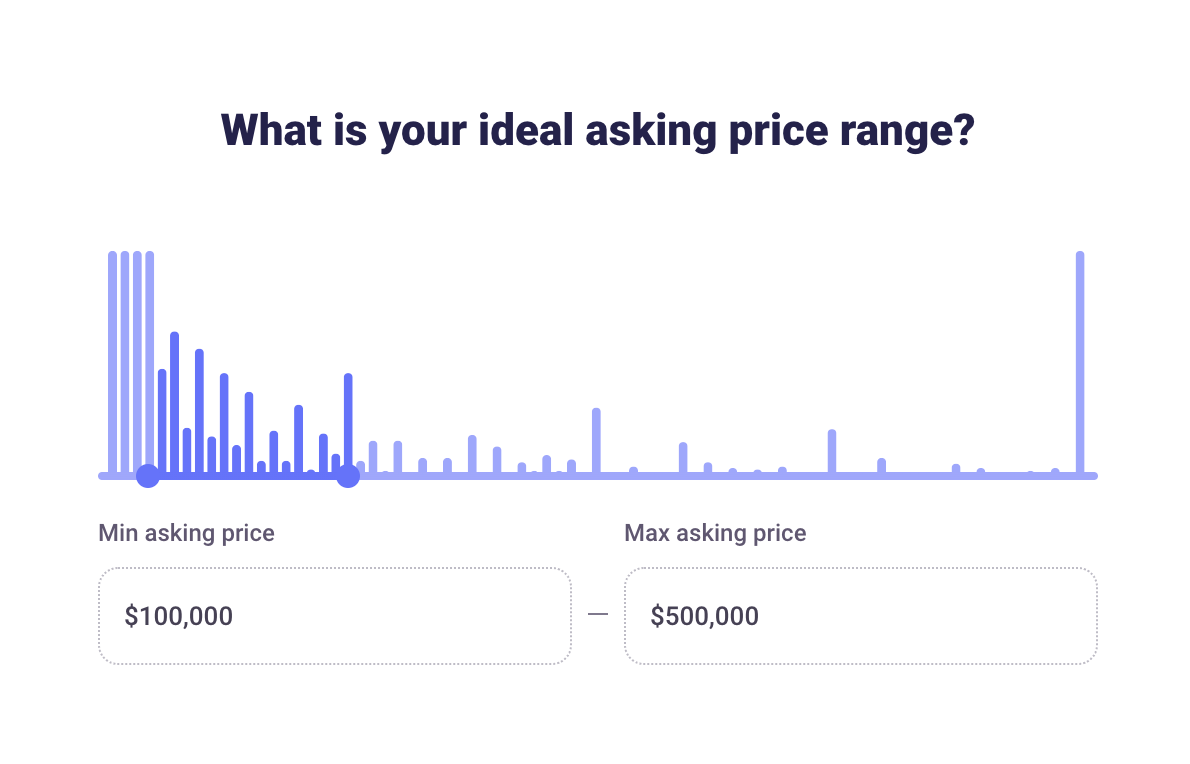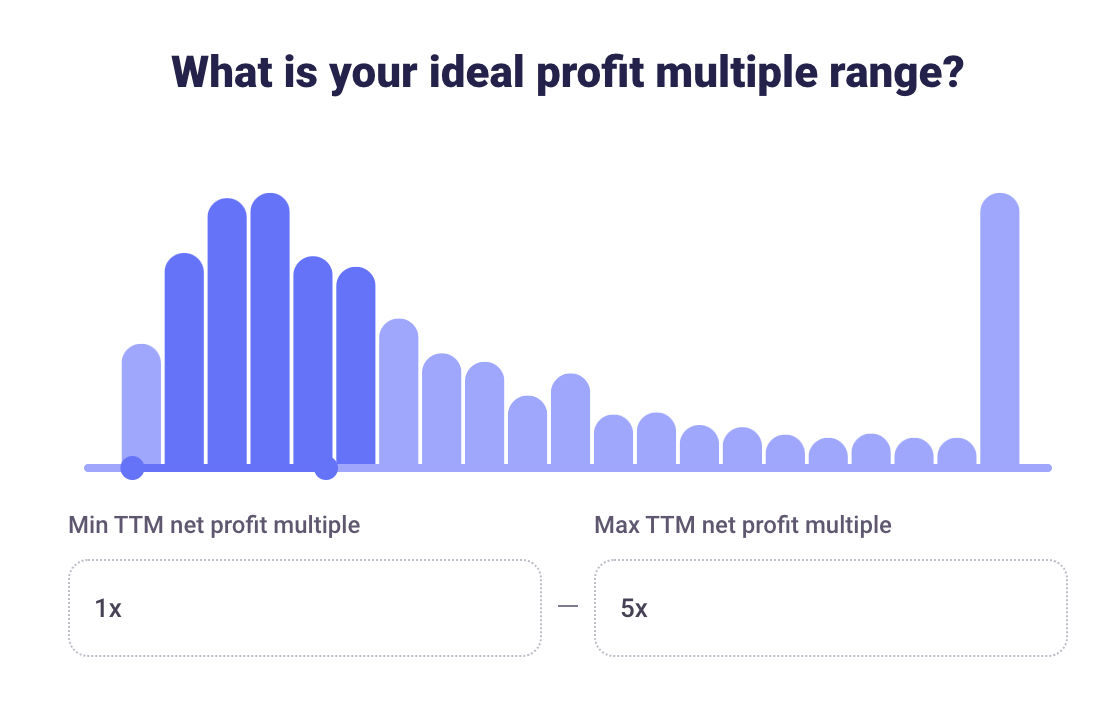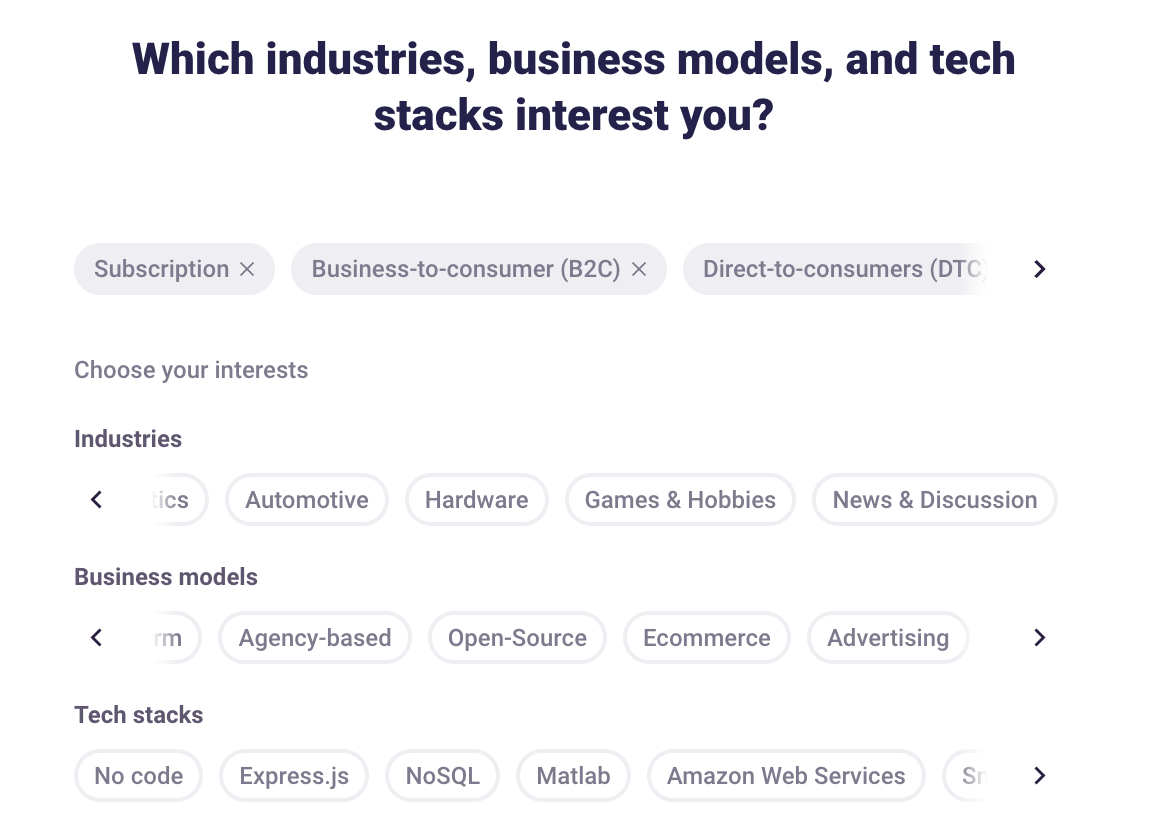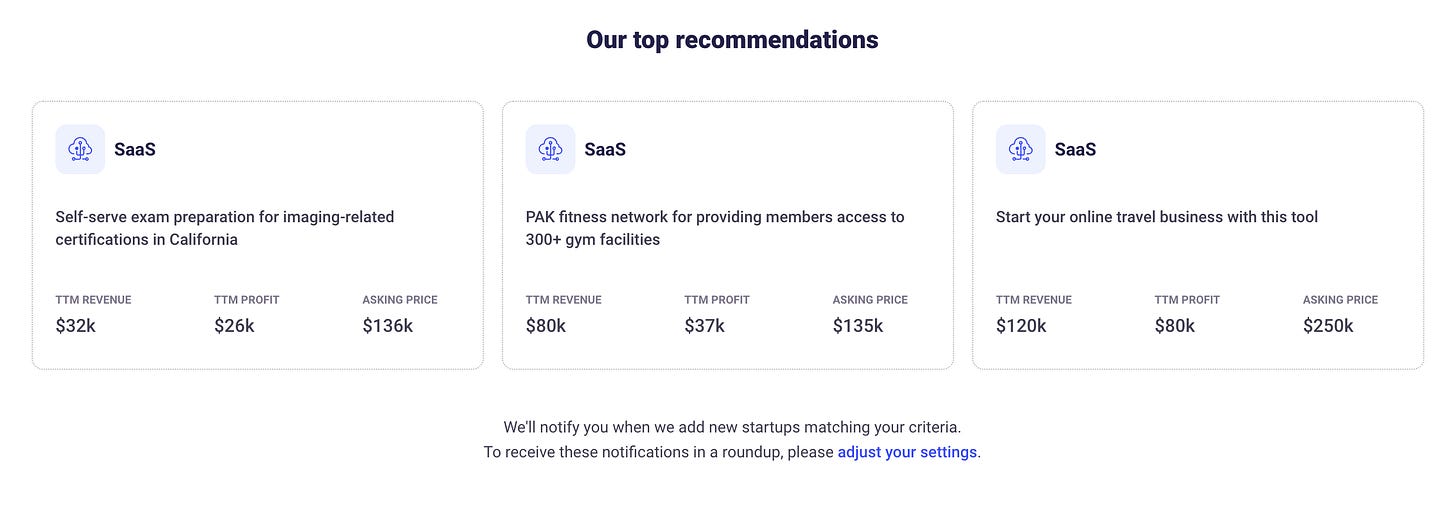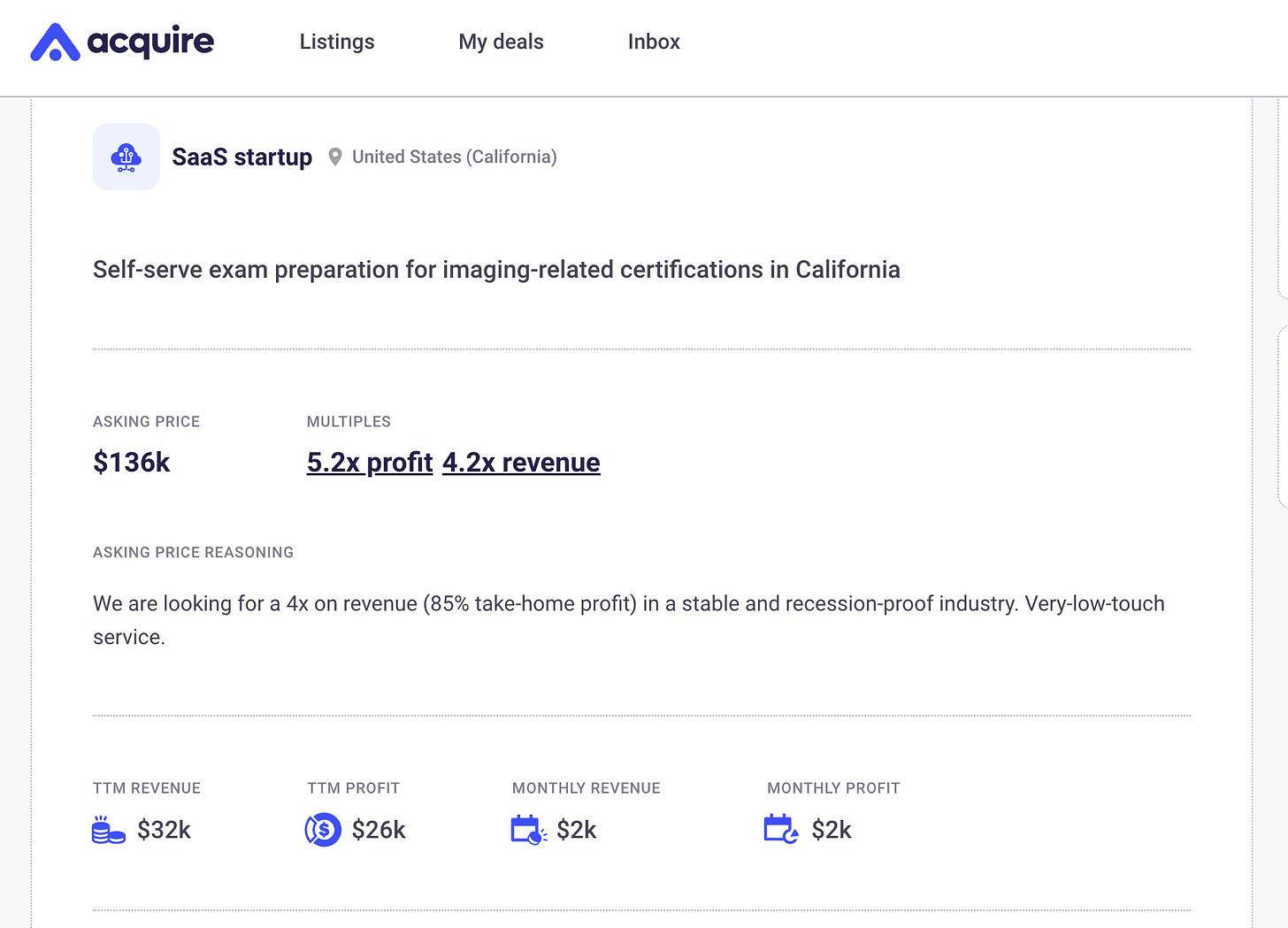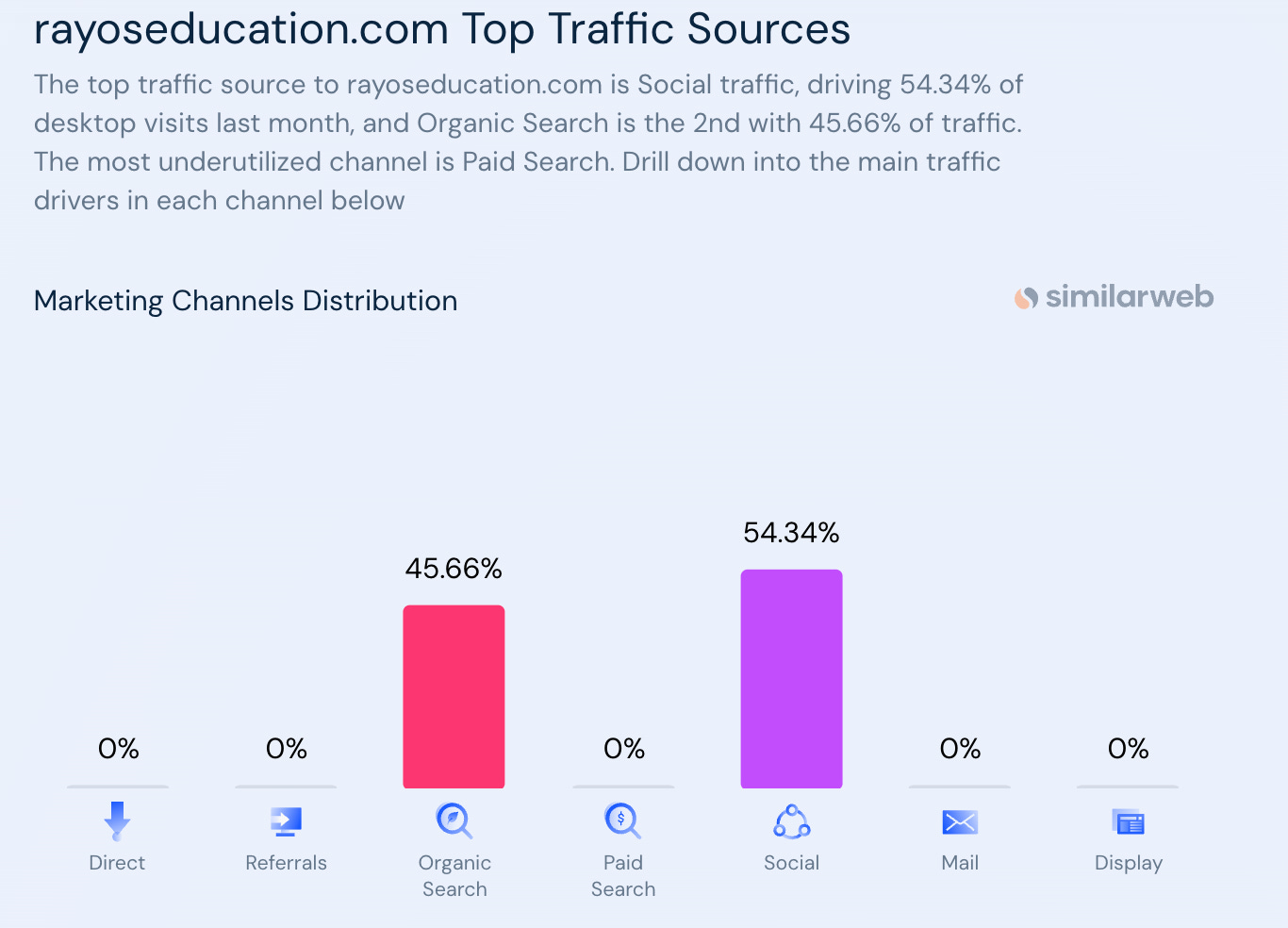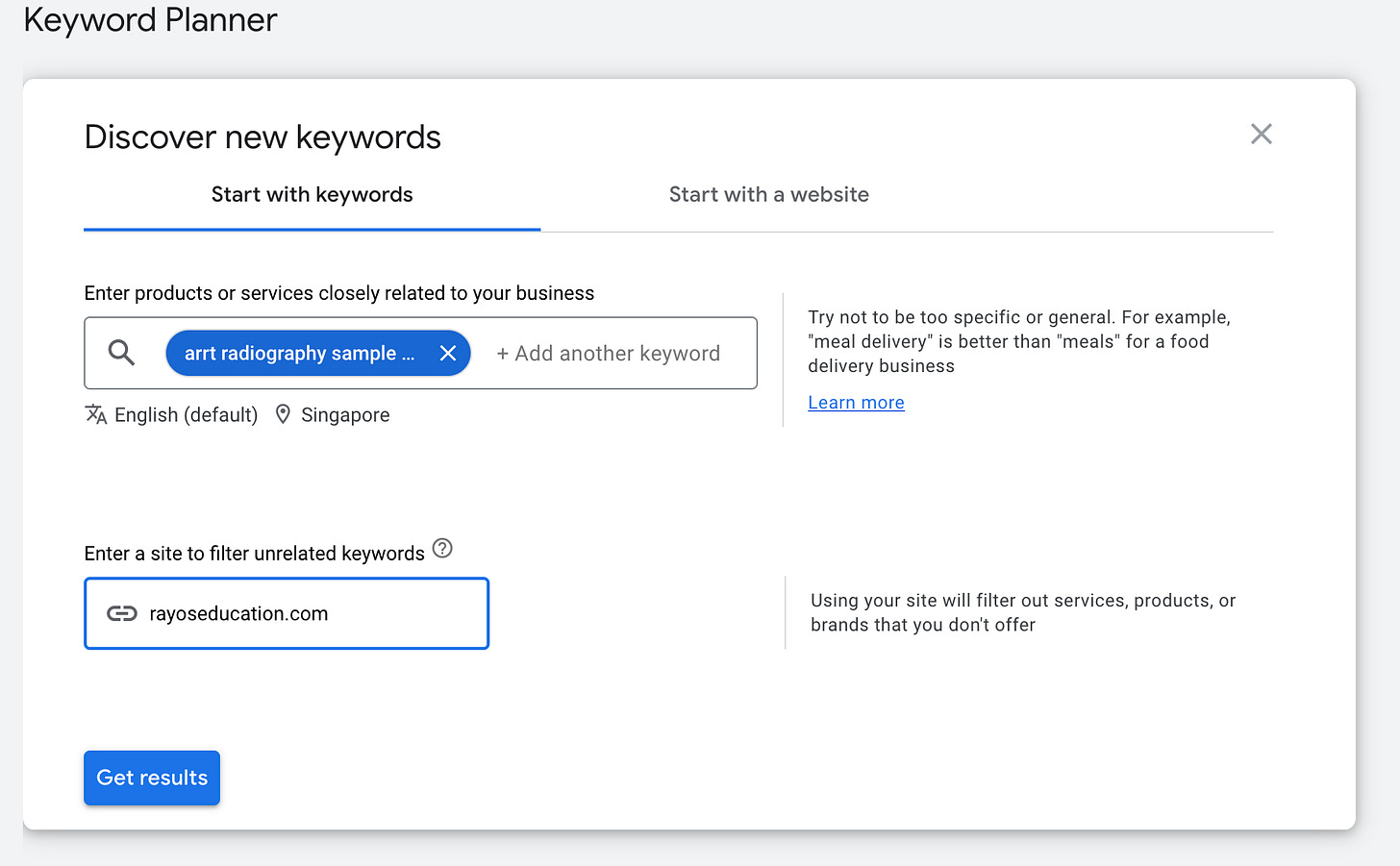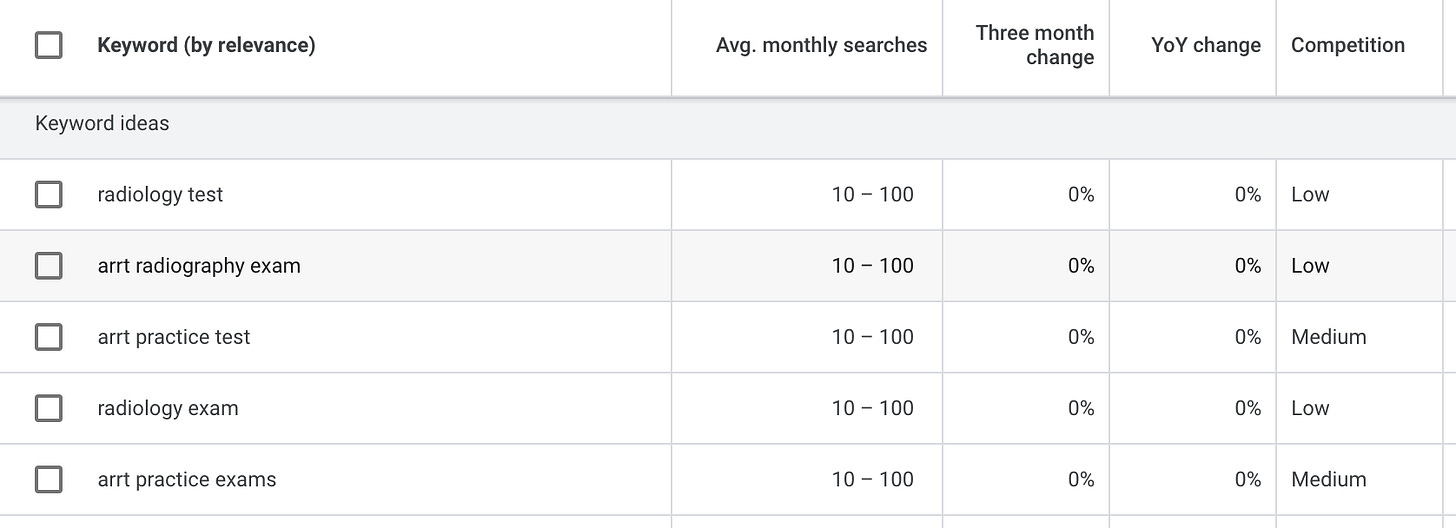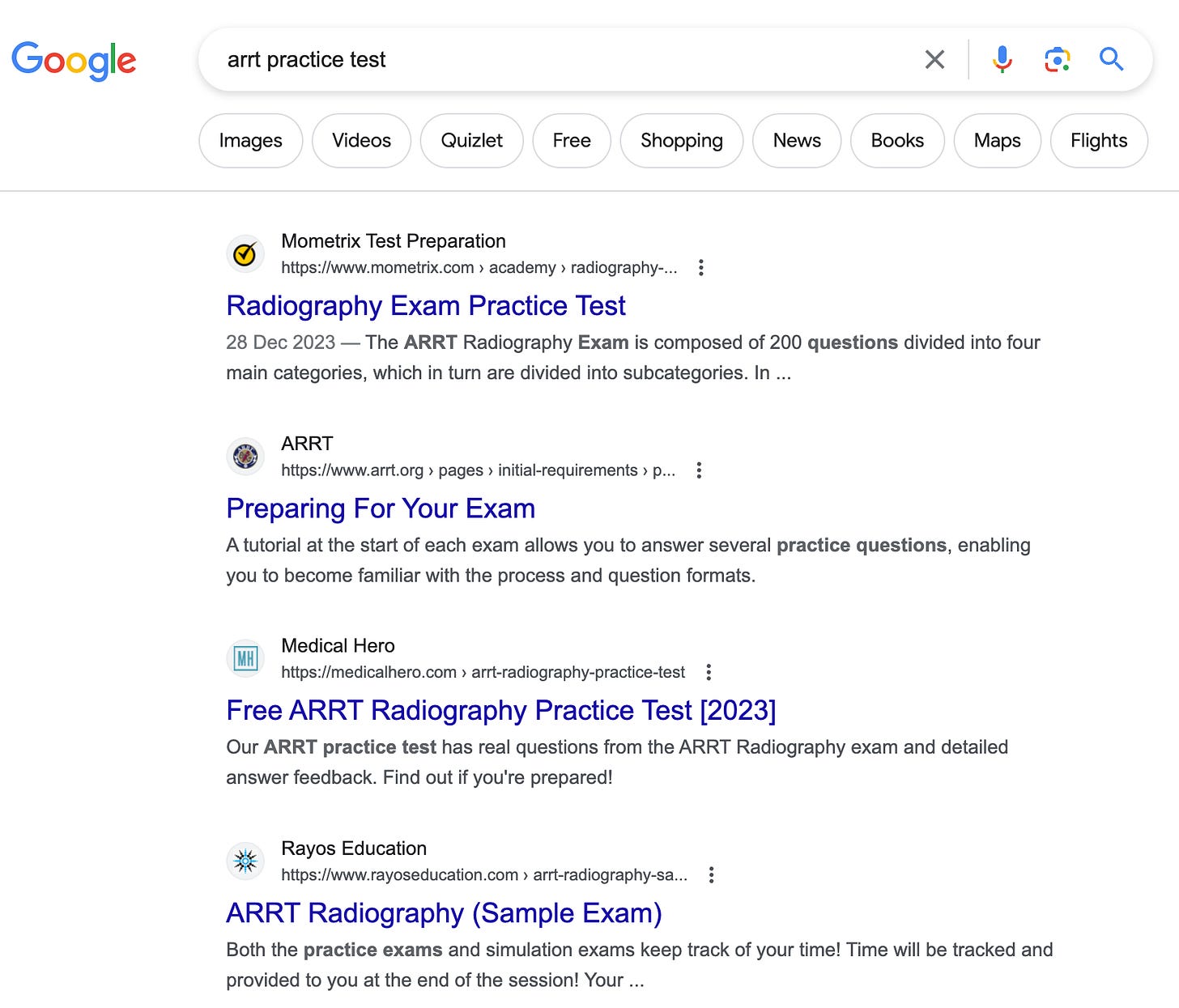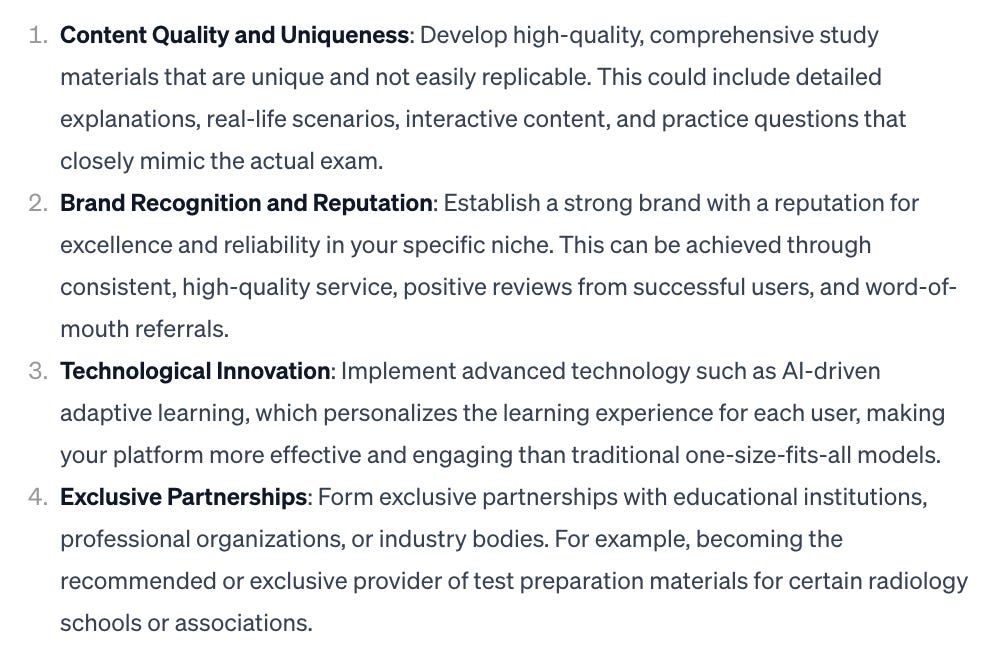How to Generate a $1 Million SaaS Idea in Just One Hour.
From research, to ideation, to product. Is it possible?
I saw a tweet recently that gave some advice on a to generate a SaaS idea. It looked something like this:
Go to acquire.com
Find a company with ARR>$100k.
Look at the top competitors (Acquire.com shows the competitors but not the company being sold)
Look at reviews of the competitors (App Store, Google Play, Trustpilot). Especially those reviews of 3 stars and below.
Ideate a solution that solves the pain that those with 3 stars and below have.
Apply some product management techniques so that solution.
Building, Marketing, Building, Marketing, Building, Marketing.
Profit? To the moon!
It’s not the first time I’ve seen a similar idea, so I wondered: is this just great in theory? What if I actually tried it out, with the help of a few extra steps? We have ChatGPT and other AI tools that can accelerate our progress.
Let’s give it a try.
Maybe I can be lazy and ask ChatGPT to do the research job
Well. That didn’t work. So let’s try something else.
Let’s go to Acquire.com and search for businesses that I might be able to build and run. Content and SaaS are things that I’m familiar with.
Ideal asking price range between 100k and 500k. Anything less than 100k is not that worthwhile for me to run myself, and businesses asking for more than 500k are likely more complicated or matured operations.
Don’t get too greedy on the multiple profit/revenue ranges.
Choose some industries and business models that I can actually handle.
Ok, looks like I have three options to begin with:
I'm most familiar with educational technology, which is why this particular option stood out to me. It shows a monthly profit of 2k, and based on their financials, there seem to be minimal monthly expenses. I'm guessing these are primarily from advertising revenue and occasional payments for a programmer or developer to address various issues.
The competitors listed are ARRT, ASRT, and Rayos Education. ARRT appears to be the American Registry of Radiologic Technologists, and ASRT, the American Society of Radiologic Technologists. Given their nature, these aren't revenue generating businesses to focus on. I presume Rayos Education aims to assist individuals preparing for exams conducted by these organizations. So let’s look into them a bit more.
According to SimilarWeb most of their traffic is coming from organic search (interesting because that means there is a possibility that a similar site to this can run on its own without any advertising spend) and social.
Organic is from these two keywords/phrases:
“rayos education discount code” - Nothing much we can do here.
“arrt radiography sample exam- rayos education” - Interesting. We can expand on it.
Let’s use Google’s keyword planner to see what other keywords there are around this:
There’s some long tail keywords we can go for here, with low or medium competition. Worth a shot.
There’s our Rayos showing up in Google results for this:
There’s some other competitors too. Interesting.
Mometrix provides unofficial study guides, online courses, and flashcards for a variety of examinations with about 1.5 million website views per month. Flashcards are priced at around $40 per set depending on the course. Questions on Mometrix are given free, for the first five, then it asks for your email to continue. Their radiology test guide is priced at $60.
MedicalHero is test prep, for what you might have guessed, is a medical test prep service which has a dedicated package for a range of medical tests. Pricing per course is $49 for one month’s access, $59 for three months, and $64 for lifetime access. There’s a dedicated landing page for each type of test prep.
This information will help us to decide on a price point because we now know that people are paying this amount for similar services.
Let’s now look at any reviews we can find (App Store, Google Play, Trustpilot). Which will help us to ideate something.
I couldn’t find anything on Google Reviews or Trustpilot for Rayos.
Mometrix has an astonishing 4.8 rating on Trustpilot. The minimal bad reviews come from people who scored well on the practice tests but badly on the real tests. The reason: The material is outdated or not relevant on the practice tests. This will need solving if we are to become a competitor. Another reason for the lower rated reviews were that people were not happy with the subscription model, which makes sense because why would someone want to pay a monthly subscription for a one -off test?
Ok. Where are we now? We need to continue with with “5. Ideate a solution that solves the pain that those with 3 stars and below have.”
So how do we solve the pain point from those negative reviews?
Keeping the questions up to date. My first thought is to allow the community to feedback on this? Will they? Probably not. Another way is to constantly check on the official updates.
Unhappiness with subscription model. So then we make it a one-off fee.
How do we make an MVP that can test whether we can sell this? How do we apply some product management techniques so that solution?
Without delving too deeply here, as I plan to cover this in future blog posts, let's focus on the key value proposition the customer seeks: being well-prepared for an exam.
How will we deliver on this value proposition?
Preparing for exams effectively involves practicing potential test questions; there's no better method. Our focus, therefore, should be on providing high-quality, exam-simulating questions. Unlike Duolingo, we don't need to gamify the process. Simply offering well-crafted questions that mirror the actual exam format is sufficient.
How will we solve the issue of questions being outdated or irrelevant to the exam?
As mentioned earlier, since I am not a domain expert, my approach would probably involve regularly checking the official site for test competencies and establishing a user feedback loop, encouraging users to report back on their exam results. Additionally, allowing users to submit their own questions could facilitate self-testing and generate valuable user-generated content.
What about MRR?
This is an infrequent product so it’s unlikely we should be looking for MRR on this. If you want to learn more about how to build a business around infrequent product usage you can check out this Reforge course at: https://www.reforge.com/blog/iced-theory-growing-infrequent-products.
Last thing. wHaT aBoUt ThE mOaT?
What about that moat? ChatGPT suggests to focus on the content quality (as we discovered from checking out Trustpilot reviews)
What about the market size?
I'm uncertain about the market size for this business, so I asked ChatGPT to provide a Fermi estimation. It suggested that around 60 people might take the exam in California each month. If I manage to get 10% of these individuals to pay for my course at a $49 price point, that equates to $294 per month. Is this venture worthwhile? I'm at a crossroads here. Should I continue with this project? Further thought is needed. Considering the 49 other states, the potential for profitability increases. Moreover, there are many other niche tests I could cater to. But would this approach dilute my brand? And would it be feasible to keep up with the syllabus for all these different tests while maintaining high-quality products for each?
Concluding thoughts
Did this really take just one hour? Yes, it did for the ideation part. Of course, evolving this into a fully functional business will undoubtedly take longer. However, I’d say it’s a worthwhile exercise compared to starting a random business.
Can it generate $1 million in revenue? That seems unlikely. Or perhaps that's just the conclusion I've reached from this one-hour exercise.
In conclusion: I’ve failed to ideate a $1m/year business from advice I saw on X/twitter but it’s mostly because I’ve not thought enough around adjacent markets and other products that I could sell based on the technology/workflows/processes that might be created during the making of such a business.
Would others have more success with this?
I’d love to know your thoughts/criticisms. Message me on X at https://twitter.com/growth_hc. Where did I go wrong?

